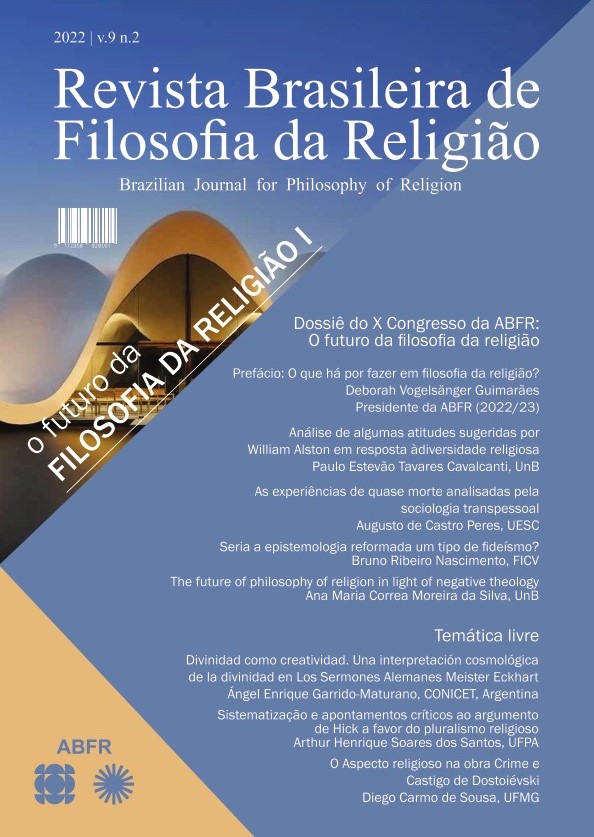Seria a epistemologia reformada um tipo de fideísmo?
DOI:
https://doi.org/10.26512/2358-82842022e52175Palavras-chave:
Epistemologia Reformada, Teísmo, Fideísmo, Epistemologia Religiosa, EvidencialismoResumo
O objetivo deste artigo é analisar se a Epistemologia Reformada constitui um tipo de fideísmo. Por Epistemologia Reformada entende-se a tese filosófica de que a crença em Deus pode ser intelectualmente justificada, racional ou avalizada, mesmo que o teísta não disponha de qualquer evidência em favor da existência de Deus. Primeiro, contudo, vou caracterizar precisamente a posição da Epistemologia Reformada a fim de entender como a crença teísta pode ser intelectualmente bem-sucedida, mesmo na ausência de provas ou evidências. Em seguida, buscarei compreender o que se quer dizer por fideísmo e em que sentido essa posição seria uma acusação ou demérito contra a Epistemologia Reformada. Por fim, vou verificar se é correto classificar a Epistemologia Reformada como uma forma de fideísmo.
Referências
ALSTON, WILLIAM (2020). Percebendo Deus. Natal: Carisma.
AMESBURY, R. (2007). “Fideism” in Stanford Encyclopedia of Philosophy.
BARRETT, J. (2012). Born Believers: the science of children’s religious belief. Nova
York: Atria Books.
BOLOS, A.; SCOTT, K. (2015). “Reformed Epistemology” in Internet Encyclopedia of
Philosophy. Available on the internet at https://iep.utm.edu/ref-epis/, accessed 2024.
CLARK, K. J. (1990). Return to Reason: a critique of enlightenment evidentialism and a
defense of reason and belief in God. Grand Rapids, Michigan: William B. Eerdmans
Publishing Company.
CLARK, K. J. (2019). God and the Brain: the rationality of belief. Grand Rapids,
Michigan: William B. Eerdmans Publishing Company.
CRAIG, W. (2012). Apologética Contemporânea: a veracidade da fé cristã. São Paulo:
Vida Nova.
CRAIG, W. L.; MORELAND, J. P. (eds.) (2009). The Blackwell Companion to Natural
Theology. Wiley-Blackwell.
GEISLER, NORMAN (2002). Enciclopédia Apologética. São Paulo: Vida.
HASKER, W. (2006). “Evidencialismo” in AUDI, R. (Org). Dicionário de Filosofia de
Cambridge. São Paulo: Paulus.
MACKIE, J. L. (1982). The Miracle of Theism: arguments for and against the existence
of God. New York: Oxford University Press.
MCINERNY, R. (1981). “Reflection on Christian Philosophy” in 100 Years of Thomism.
University of St. Thomas, Houston: 63-73.
MEYER, S. (2022). O Regresso da Hipótese de Deus: três descobertas científicas que
revelam a mente por trás do universo. Lisboa: Edições 70.
NASCIMENTO, B. R. (2023). Deus é uma hipótese científica? Unus Mundus, Belo
Horizonte, 2, Jul-Dez, 2023. Available on the internet at https://
unusmundus.academiaabc2.org.br/deus-e-uma-hipotese-cientifica/, accessed 2024.
PENELHUM, T. (1983). God and Skepticism: A Study in Skepticism and Fideism.
Boston: Reidel Publishing Co.
PENELHUM, T. (2019). “Fideísmo” in Crítica na Rede. Available on the internet at
https://criticanarede.com/fideismo.html, accessed 2024.
PLANTINGA, A. (1983). “Reason and Belief in God”. in PLANTINGA, A.;
WOLTERSTORFF, N. (eds.), Faith and Rationality: reason and belief in God.
University of Notre Dame Press: 16-93.
PLANTINGA, A. (2001). “Swinburne and Plantinga on Internal Rationality”. Religious
Studies, 37 (3): 357-358.
PLANTINGA, A. (2016). Conhecimento e Crença Cristã. Brasília: Monergismo.
PLANTINGA, A. (2018a). Crença Cristã Avalizada. São Paulo: Vida Nova.
PLANTINGA, A. (2018b). Ciência, Religião e Naturalismo: onde está o conflito? São
Paulo: Vida Nova.
PLANTINGA, A. (2018c). “Two Dozen (or so) Theistic Arguments” in WALLS, J.;
DOUGHERTY, T. (eds.) (2018). Two Dozen (or so) Arguments for God. Oxford
University Press.
QUINN, P. L. (1985). “In Search of the Foundations of Theism”. Faith and Philosophy,
(4): 469-486. Available on the internet at https://place.asburyseminary.
edu/faithandphilosophy/vol2/iss4/11, accessed 2024.
REID, T. (2013). Investigação sobre a Mente Humana Segundo os Princípios do Senso
Comum. São Paulo: Vida Nova.
RULOFF, C.; HORBAN, P. (eds.) (2021). Contemporary Arguments in Natural
Theology: God and rational belief. Bloomsbury Publishing.
RUSSELL, B. (1977). Fundamentos de Filosofia. Rio de Janeiro: Zahar.
RUSSELL, B. (2014). Por que Não Sou Cristão e Outros Ensaios a Respeito de Religião
e Assuntos Afins. Porto Alegre: LP&M.
SWINBURNE, R. (2019). Existência de Deus. Brasília: Monergismo.
WOLTERSTORFF, N. (1983). “Can Belief in God Be Rational if it Has no Foundations?
in PLANTINGA, A.; WOLTERSTORFF, N. (eds.), Faith and Rationality: reason and
belief in God. University of Notre Dame Press: 16-93.
WOLTERSTORFF, N. (2001). Reformed Epistemology. in PHILLIPS, D. Z.; TESSIN,
T. (eds.), Philosophy of Religion in the 21st Century. Palgrave: 39-63.
WOLTERSTORFF, N. (2011). “Reason and Trust in Reid”. Canadian Journal of
Philosophy, 41 (S1), 183-196. Available on the internet at https://www.cambridge.org/
core/journals/canadian-journal-of-philosophy/article/abs/reason-and-trust-in-reid/
BD59FD5E7A2D718B774181C7B82210C, accessed 2024.
WOLTERSTORFF, N. (2023). Discurso Divino: reflexões filosóficas sobre a tese de que
Deus fala. Viçosa: Ultimato
Downloads
Publicado
Edição
Seção
Licença
Copyright (c) 2024 Revista Brasileira de Filosofia da Religião

Este trabalho está licenciado sob uma licença Creative Commons Attribution 4.0 International License.

